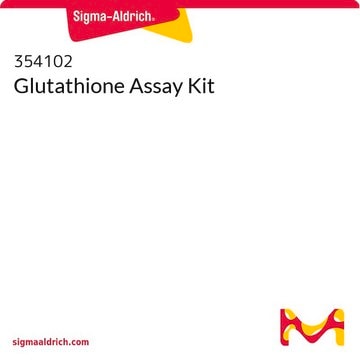CS0260
Glutathione Assay Kit
sufficient for 700 assays
Sinónimos:
GSH Quantification Test
Iniciar sesiónpara Ver la Fijación de precios por contrato y de la organización
About This Item
UNSPSC Code:
12161503
NACRES:
NA.84
Productos recomendados
General description
The kit provides all reagents for simple and quick assay to measure the level of total glutathione (GSSG + GSH) in a cell and tissue extracts and in red blood cells or plasma. The sample is first deproteinized with the 5% 5-sulfosalicylic acid solution. Glutathione content of the sample is then assayed using a kinetic assay in which catalytic amounts of glutathione cause a continuous reduction of 5,5′-dithiobis-(2-nitrobenzoic) acid (DTNB) to TNB. The oxidised glutathione formed is recycled by glutathione reductase and NADPH. The product, TNB, is assayed colorimetrically at 412 nm.
Application
Glutathione Assay Kit has been used to measure total glutathione concentration in glutathione assay. It also has been used to determine different oxidative stress parameters in rats.
Biochem/physiol Actions
Glutathione (GSH) functions as a cofactor for several antioxidant enzymes. It is involved in the regeneration of vitamins C and E. It modulates cellular proliferation and apoptosis. GSH is crucial for mitochondrial functioning and the maintenance of mitochondrial DNA (mtDNA). Mutations in this gene are associated with Alzheimer′s, Parkinson′s and Huntington′s diseases. It is also linked to cystic fibrosis, immune diseases and cardiovascular diseases.
Reduced glutathione (GSH), a tripeptide (g-glutamyl-cysteinylglycine), is the major free thiol in most living cells and is involved in many biological processes such as detoxification of xenobiotics, removal of hydroperoxides, and maintenance of the oxidation state of protein sulfhydryls. It is the key antioxidant in animal tissues
Features and Benefits
- A quick and simple method
- The kit contains all the reagents required for a colorimetric assay of total glutathione (oxidised + reduced GSSG + GSH)
- The kit includes a deproteination reagent for biological samples
Solo componentes del kit
Referencia del producto
Descripción
- Assay Buffer 5x 30 mL
- DTNB 8 mg
- DMSO 7.5 mL
- Glutathine Reductase 20 U
- L-Glutathione Reduced 300 μg
- NADPH 25 mg
- 5-Sulfosalicylic Acid 2.5 g
Related product
Referencia del producto
Descripción
Precios
signalword
Danger
hcodes
Hazard Classifications
Eye Dam. 1 - Resp. Sens. 1 - Skin Corr. 1B
Storage Class
8A - Combustible corrosive hazardous materials
flash_point_f
188.6 °F
flash_point_c
87 °C
Certificados de análisis (COA)
Busque Certificados de análisis (COA) introduciendo el número de lote del producto. Los números de lote se encuentran en la etiqueta del producto después de las palabras «Lot» o «Batch»
¿Ya tiene este producto?
Encuentre la documentación para los productos que ha comprado recientemente en la Biblioteca de documentos.
Los clientes también vieron
Assay of glutathione, glutathione disulfide, and glutathione mixed disulfides in biological samples.
T P Akerboom et al.
Methods in enzymology, 77, 373-382 (1981-01-01)
Genotoxicity of hydroquinone in A549 cells
Peng C, et al.
Cell Biology and Toxicology, 29(4), 213-227 (2013)
Rat testicular impairment induced by electromagnetic radiation from a conventional cellular telephone and the protective effects of the antioxidants vitamins C and E
Al-Damegh MA
Clinics, 67(7), 785-792 (2012)
Nicol M Caplin et al.
Frontiers in plant science, 11, 389-389 (2020-05-01)
The effects of ionising radiation (IR) on plants are important for environmental protection but also in agriculture, horticulture, space science, and plant stress biology. Much current understanding of the effects of IR on plants derives from acute high-dose studies but
Maria Swastika et al.
Malaria journal, 19(1), 208-208 (2020-06-20)
Glucose-6-phosphate dehydrogenase (G6PD) deficiency is the most common enzyme disorder in the world. Its main function is to generate NADPH that is required for anti-oxidative pathway in the cells especially in red blood cells (RBC). G6PD deficiency is X-linked and
Nuestro equipo de científicos tiene experiencia en todas las áreas de investigación: Ciencias de la vida, Ciencia de los materiales, Síntesis química, Cromatografía, Analítica y muchas otras.
Póngase en contacto con el Servicio técnico




